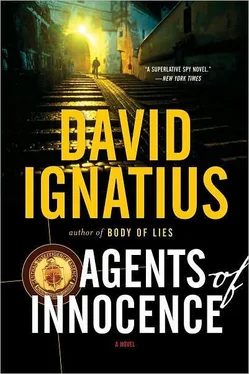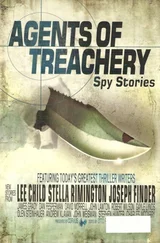David Ignatius - Agents of Innocence
Здесь есть возможность читать онлайн «David Ignatius - Agents of Innocence» весь текст электронной книги совершенно бесплатно (целиком полную версию без сокращений). В некоторых случаях можно слушать аудио, скачать через торрент в формате fb2 и присутствует краткое содержание. Жанр: Шпионский детектив, на английском языке. Описание произведения, (предисловие) а так же отзывы посетителей доступны на портале библиотеки ЛибКат.
- Название:Agents of Innocence
- Автор:
- Жанр:
- Год:неизвестен
- ISBN:нет данных
- Рейтинг книги:3 / 5. Голосов: 1
-
Избранное:Добавить в избранное
- Отзывы:
-
Ваша оценка:
- 60
- 1
- 2
- 3
- 4
- 5
Agents of Innocence: краткое содержание, описание и аннотация
Предлагаем к чтению аннотацию, описание, краткое содержание или предисловие (зависит от того, что написал сам автор книги «Agents of Innocence»). Если вы не нашли необходимую информацию о книге — напишите в комментариях, мы постараемся отыскать её.
Agents of Innocence — читать онлайн бесплатно полную книгу (весь текст) целиком
Ниже представлен текст книги, разбитый по страницам. Система сохранения места последней прочитанной страницы, позволяет с удобством читать онлайн бесплатно книгу «Agents of Innocence», без необходимости каждый раз заново искать на чём Вы остановились. Поставьте закладку, и сможете в любой момент перейти на страницу, на которой закончили чтение.
Интервал:
Закладка:
Rogers pondered the question. He thought he knew the answer.
“In our world,” continued Stone, “reliability is inevitably a question of many different shades of gray. To simplify our task in making judgments about people, I often recommend two sorts of yardsticks.
“The first is the quality and accuracy of the information the agent is providing. If it’s good information, people will usually overlook the operational details of how it was obtained. The second measure is to set practical tests that can establish an agent’s bona fides. Ask him to do something particular for you. Tell him you need a certain piece of information that only he can obtain. If he does what you ask, then you will develop confidence in him.”
Stone smiled contentedly and turned over his last card.
“This brings me to the question at hand, regarding your agent in Fatah. The information we have received from him thus far is solid stuff. Very promising. As you say, control may be impossible at this stage. But how can we answer Mr. Marsh’s concerns, and my own, and gain a greater measure of reliability and trust?”
“By testing him,” said Rogers.
“Just so. I believe we should set a small test for your man and see how he responds. It should be something that is in the interest of his organization as much as ours, so that he won’t feel like a traitor.”
“Any suggestions?” asked Rogers.
“Actually, yes. I do have a suggestion. From what I have read in the agent’s 201 file, I believe an appropriate target exists in the Democratic Front for the Liberation of Palestine. Here we have a radical pro-Soviet group, staging terrorist operations that undercut Fatah and challenge its position in the PLO. Your man evidently shares our view, because he has already passed along information to you about this group. Now I think you should tell him that we wish to go further. We want to plant a microphone in the offices of the DFLP in Beirut and we need his assistance.”
“It’s worth a try,” said Rogers. “But I have to tell you I think it’s a long shot.”
“That is not an adequate reason not to make the effort,” said Stone.
“Yes, sir,” answered Rogers. “How long will it take the Technical Services people to make the arrangements?”
“Actually,” said Stone with a slightly apologetic tone, “the arrangements are already being made. I asked several people from TSD to study the problem. They have a first-rate scheme. A paper-weight in the shape of a map of Palestine that would contain a microphone and transmitter. Irresistible for anyone in the PLO, they reckon.
“All your man has to do is put this device in the office of the fellow who heads the DFLP. He can give it to him as a present, or leave it behind by accident after a meeting, or sneak it into his office. Whatever he likes. It’s really quite a simple operation. Almost risk-free. Far less than we normally ask agents to do.”
“What if he says no?” asked Rogers. He didn’t want to hear the answer.
“Then we will have a bit of a problem,” said Stone. “Marsh will recommend that we make a more direct attempt to establish control.” Stone paused and gave a sad smile. “I will probably support his recommendation.”
“Understood,” said Rogers. “I’ll do my best.”
“You can pick up the little gadget tomorrow morning,” said Stone, his three-act play finally complete.
19
Cairo; May 1970
Holding the next meeting in Egypt was Jamal’s idea. Rogers thought it was crazy. Why hold a supposedly clandestine meeting in the heart of enemy territory, surrounded by thousands of gumshoes from the Egyptian Moukhabarat? Why travel to the center of Soviet influence in the Middle East?
Jamal insisted that Egypt would be safe. He knew the Egyptian security service from his training there, he told Fuad. He knew how they tapped phones and how they conducted surveillance. They were incompetent. Rogers shouldn’t worry. It was almost as if Jamal wanted to demonstrate his proficiency as an intelligence officer. Rogers reluctantly agreed to meet in Cairo and packed his bags once again.
They set the meeting for early May, when Jamal had to be in Cairo on Fatah business. Fuad gave Jamal the address of a CIA safehouse in the Cairo suburb of Heliopolis. It was an apartment on a quiet street in a Coptic Christian neighborhood where the Nasser regime had few friends. Jamal should proceed to the apartment, use the agreed password, and enter. If no one answered, he should return the next day, an hour earlier, and try again. Avoiding surveillance on his way to the meeting would be Jamal’s problem, Fuad said. Jamal scoffed at the precautions.
Rogers arrived in an Egypt that was hobbling along in the waning days of Gamal Abdel Nasser. It was like visiting the locker room of a baseball team that has lost twenty straight games. The Egyptians were surviving on their good humor. The dreams and illusions of Nasser’s revolution had been shattered by the 1967 War, when Nasser’s boasts about Arab military power had been revealed as puny lies. Yet the good-natured Egyptians forgave their leader everything. When he spoke, the masses still chanted: “Nasser! Nasser!” The name translated as: “Victory! Victory!” Perhaps they meant it as a joke.
A thin veneer of Nasser’s socialism overlay Egypt, but it was warping and peeling at the edges. Beneath were the residues of so many other cultures-British, French, Ottoman, Bedouin, Roman, Greek-left behind by each wave of invaders that had sojourned in Egypt since the days of Pharoah. Walking around Tahrir Square downtown, Rogers felt as if he was suspended in several centuries at once. Above him were the French-style facades of the old commercial buildings, their ornate moldings and capstones barely visible under the grime of the city; ahead were the modern Egyptian bureaucrats and businessman in their sharp suits, mopping their brows in the Cairo heat; below, in the shadows, were the fellabin, the peasants from the villages of the Nile Delta, ragged and barefoot, relieving themselves in alleyways and on doorsteps, laughing and telling crude jokes. All around was the incessant noise of cars honking their horns and merchants peddling their wares and pedestrians bantering in musical Egyptian Arabic.
Rogers was staying at the Nile Hilton, a grand American hotel along the river that had become, paradoxically, the favorite haunt of President Nasser. It was an island of sanity and efficiency in the middle of chaotic Cairo. Egyptian novelists came to the air-conditioned Coffee Shop to write their books in the cool and calm; Moslem brides held their wedding receptions in the crowded lobby, blushing as a chorus sang tales of the wedding night. It was the place where all Cairo met and socialized.
Rogers arrived a day before his meeting and practiced losing the Moukhabarat surveillance teams, the little men in baggy suits who waited in clusters outside the hotel. He found that it was easy and wondered whether perhaps Jamal had been right.
The day of the meeting, Rogers slipped out the back door of the hotel and walked several blocks up Kasr el-Nil Street to Talat Harb Square, where he hailed a taxi. He had the taxi drive to Dokki, across the river. He stopped there, checked for surveillance, and took another taxi back toward the center of town. He shifted cars one more time before heading to Heliopolis. When he finally arrived in the neighborhood of the safehouse, he had the taxi drop him a block from his true destination and walked the rest of the way, stopping twice to check for little men in baggy suits.
Jamal arrived on schedule an hour later. Rogers barely recognized him. He was dressed like a bawab, a humble doorman, in a dirty gray gallabiya, muddy leather sandals, and a turban-like scarf that covered his head and most of his face. It was a discordant sight: the dark lustrous hair and fine features of a movie star, wrapped in the rags of a beggar. Rogers found the outfit faintly comical and said so.
Читать дальшеИнтервал:
Закладка:
Похожие книги на «Agents of Innocence»
Представляем Вашему вниманию похожие книги на «Agents of Innocence» списком для выбора. Мы отобрали схожую по названию и смыслу литературу в надежде предоставить читателям больше вариантов отыскать новые, интересные, ещё непрочитанные произведения.
Обсуждение, отзывы о книге «Agents of Innocence» и просто собственные мнения читателей. Оставьте ваши комментарии, напишите, что Вы думаете о произведении, его смысле или главных героях. Укажите что конкретно понравилось, а что нет, и почему Вы так считаете.












